|
A friend wrote a post in response to my post about coming out in 2007 versus 2017, waxing nostalgic about her coming out in the late 1990s. You may not agree with all--or any--of it, but I hope you'll read it and share your comments, especially if you're a BW reader who came out before 2000. Thank you, anonymous awesome friend for picking up the Butch Wonders slack during a helluva tough work week for yours truly.
I was struck by the recent post about what it is like to come out as a lesbian in 2007 vs 2017... I realize I’m dating myself, but it made me think back to when I came out (in high school, in 1998). This was right around when Ellen came out, the same year that Matthew Shepard was murdered, and the year before "Better than Chocolate" came out (if you can believe such a year existed)--way before gay was cool (or even passe, which I think we’re rapidly approaching). And yet, I still think it was a better year to come out than the two decades afterward, for the following reasons:
5 Comments
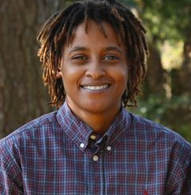 Jameka Evans was a security guard at Georgia Regional Hospital in Savannah, Georgia. From the beginning of her employment in 2012, Evans was treated badly. She was harassed verbally and physically; she was criticized for wearing a "male" uniform and having a short haircut, and for not carrying herself in a "traditional woman[ly] manner." In short, she was being harassed for both her gender presentation and her sexual orientation. Evans left her job about a year later, sick of the constant harrassment, and filed a complaint under a federal law known as "Title VII." Title VII prevents discrimination on the basis of sex, including sex stereotyping. The case went to a federal district court, where she lost because the court said that Title VII was intended to protect "sex," not "homosexuality." Evans then appealed to the next court up (the 11th Circuit, since she lives in Georgia), saying that Title VII prevented discrimination against her on the basis of sexual orientation and gender presentation. That court, too, ruled against her (and as a Slate article pointed out, the ruling was weird in a variety of ways). The court separated the gender nonconformity part from the sexual orientation part. They vacated (basically overturned, but without creating precedent) that part of the district court's order, saying that she could go back and try with that part of the case again. Evans and her lawyers then asked for something called an "en banc" hearing, which means that instead of the usual three-judge panel, all the judges on the 11th Circuit would have heard the case. This was denied, meaning that the ruling against Evans stands--at least, until the U.S. Supreme Court says otherwise. So Evans, represented by Lambda Legal, decided to petition the Supreme Court to hear the sexual orientation part of the case. The petition (which you can download from this site if you're interested) is terrific, clearly explaining why discrimination on the basis of sexual orientation is a form of gender discrimination. It states, "It cannot be that Title VII allows an employer to fire Sharon for exercising her constitutional right to marry her girlfriend while retaining her co-worker Samuel after he marries his." Will the Supreme Court take the case? Who knows. But I suspect it will, since nearly all the circuits have weighed in, there's a circuit split (thanks to the 11th Circuit), and it's an important issue. To go back to the gender nonconformity piece for a minute: it's kind of interesting: Title VII definitely applies to "sex stereotyping" (as the Supreme Court decided in a 1989 case called Price Waterhouse v. Hopkins), which is what courts rely on to explain that gender nonconformity is covered. Which would seem to mean that trans people are definitely covered, right? So if the Supreme Court ruled against Evans, a few things would happen that seem like sort of untenable outcomes:
Anyhow, it's an exciting case with huge implications. Keep an eye on this one, dear readers. A younger friend of mine is coming out as a lesbian, and I've been talking her through some different aspects of it. It's now been just over a decade since I came out as gay myself, and I've been thinking a lot about what's gotten harder, what's gotten easier, and what hasn't changed much at all. Here are my thoughts. How about you, dear readers? I'd love to hear how you think coming out has changed in the last 10 years. What's different? What's not? In 2013, I wrote one of my most-read posts: "Clothing Designed for Butches (Yes, really!)." It got a ton of traffic and 31 comments, suggesting that this is an area of major interest for butches and other BW readers. But a couple of days ago, I got a text from my butch buddy C, who told me that Saint Harridan was closed. I did a little googling, and it appears that all three butch clothing brands I profiled four years ago have closed, either permanently or temporarily: Tomboy Tailors, Fourteen, and Saint Harridan. And guess what? So have a bunch of others, including: Marimacho, Original Tomboy, and Androgynous Fashion. Augh! Today I'm featuring five currently open butch- and butch-friendly clothing companies, and if people are interested, I'll feature more over the coming weeks. There are a bunch out there, for everything from boots to bags to bespoke suits, but it can take a bit of digging to find them (and some are extremely pricey). If you have a favorite, put it in the comments and I'll be sure to share it in my next post about butch clothing companies. For now, check out these five:  TomboyX. They sell underwear, and their specialty is super-soft boxer briefs for butchy types. My buddy C was telling me about these, and around the same time, the company reached out and asked if I wanted to try some. Um... Yes! So I did, and I love them. I went for the 4.5" trunks, and although they do ride up a tad (I think I'll try the 6" or 9" this winter), they are incredibly soft and the seam doesn't show through pants. I'm not usually a boxer-briefs kind of butch (traditional three-in-a-pack Hanes women's sporty briefs for me, thanks), but TomboyX could make a convert out of me. I LOVE wearing nice warm briefs that don't have a fly or extra room up front! They have tons of styles--some of my favorites are pictured above.  Focx is another underwear company who designs its products with queer women in mind. It's based in Britain and I've tried their stuff, too. The style is different from TomboyX in a few ways: a wider variety of wild prints (see above), a smaller variety of lengths, and slightly different material--to me, it had more "sheen" and felt a little less cottony and a little more swimsuity (pretty sure those are the technical fashion terms). TomboyX fit me better and the seam showed through my pants less, but it's worth trying both if you're looking for just the right butch underthings.  WildFang has been around for quite a while--since at least 2013, and maybe even longer. They've got tees, collared shirts, casual suiting, jackets, and more. TBH, they're not really my style. Too ornate for me, maybe? Or just too young? Not masculine enough? Not suitable for my professional dress? I can't quite put my finger on it, but I've never been moved to order anything from them. You should definitely check them out and see if they're your style, though--and if so, send me a pic!  Tomboy Toes is a shoe company that designs masculine-styled shoes in a much wider variety of sizes than most men's shoe companies do. If you're like me and always lamenting that your favorite styles start at a men's 7 and 7.5 (just out of reach for yours truly), lament no more. I'm thinking of ordering the blue downtown dappers, which somehow are only $67(?!). A friend also recommended Acemarks to me, which--though they don't explicitly advertise to queer women--start around size 5. Unfortunately, they also start around $250–300 per pair, which is why I haven't tried them yet. #fashiongoals  Seven Even Clothing doesn't sell anything I'm lacking options for in terms of fit. That is, they sell stuff like hats, sweatshirts, tees, and mugs--stuff I can find lots of perfectly-sized versions of in the wider world. While I wish that they made stuff like button-up shirts or shoes or socks or anything else I have trouble getting to fit me, I appreciate the fact that they're a queer-focused company, and they definitely have some cool designs. In addition to letting me know what other companies I should feature, please comment to let me know what you're looking for--what you can never seem to find in your size, style, and/or price range. I'll see what I can find for you! "You have to be patient--things are changing in most places, I think."
"Sure, there's prejudice in a few places, but most people are pretty accepting now." "Gay people basically have equal rights--of course, a few people discriminate, I'm sure, but that will always be true." "I just don't think it's the federal government's business." These are the kinds of statements BW readers have heard from well-intentioned friends and loved ones in the past few months--I'm talking about gay-friendly-ish Republicans defending their decision to vote for Trump on the grounds that Clinton "still would have been worse," and that Trump isn't doing anything really bad to LGBTQ people. The "really bad" thing to do to gay people, it turns out, is to leave them to the mercy of their home states and local governments. As an excellent opinion piece from Frank Bruni pointed out last week, LGBTQ life varies drastically across the U.S.--not just state by state, but by towns, counties, cities, and precincts as well. As Bruni writes, "We're at the mercy of our ZIP codes." The discrepancies between municipalities are jaw-dropping. And the cultural discrepancies can be even starker than the legal ones. If you don't believe me, check out the so-called "'Christian' Manifesto on Human Sexuality," signed by 150 evangelical Christian leaders. And these aren't "fringe" extremists, either; they include people like James Dobson, who heads Focus on the Family--a nonprofit organization with over $90 million in annual revenue that's a major player in public policy. (They have a ton of resources online for people who "struggle" with homosexuality, including this website, which helpfully explains that men become gay because they believe they are either not "really" men, or that they believe they are inadequate as men, which makes them "seek another man's manhood." It's less clear what they think is going on with lesbians. But I digress.) A failure to protect LGBTQ people from hostility is tantamount to hostility itself. Trump's Department of Justice has said that they don't think federal employment discrimination applies to gay people (a huge change from Obama's DOJ). This is kind of like saying that while you don't think people should drown, you're fine with keeping the life rafts to yourself. But although the day-to-day texture of our rights is largely determined at the local level, it's the federal government's role to set the baseline. Yeah, you can run your city however you want, but here are some things you can definitely not do: prevent women from voting, ban black people from your store, or fire someone for being gay. The first two are unthinkable. The last one happens all the time, and is perfectly legal in over half of states. That's right--not just a few Southern stragglers who are late to the gays-are-okay party--over half of states. Supposedly, "conservatives" are the ones who hold true to certain fundamental values. If equality is one of these values, the worst possible way to reach it is letting municipalities do whatever they please when it comes to fundamental rights. And with the current state of the Republican party, voting Republican in federal elections is not "conservative;" it is regressive. This is my plea to blue-state Republicans who consider themselves allies of the LGBTQ community. In certain ways, the place you live gives you the "luxury" of being Republican. You don't have to see your co-workers fired for being gay. Your churches aren't removing people from leadership positions when they come out. Your funeral homes aren't refusing to provide services for people who were in same-sex partnerships. Your kids aren't being bullied by public school teachers. Because of where you live, you rarely witness the terrible discrimination and ridicule that your LGBTQ loved ones can face as soon as they set foot outside your accepting municipality. If you want to vote Republican in your local elections, that's one thing. But as this administration's actions are making clear, voting Republican in federal elections is a whole other ballgame: you are essentially stripping protection from the people you claim to love. You are stealing their life raft. I'm not convinced that doing this is actually "conservative." And I'm even less convinced that if you do so, you can consider yourself much of an ally at all. |
|
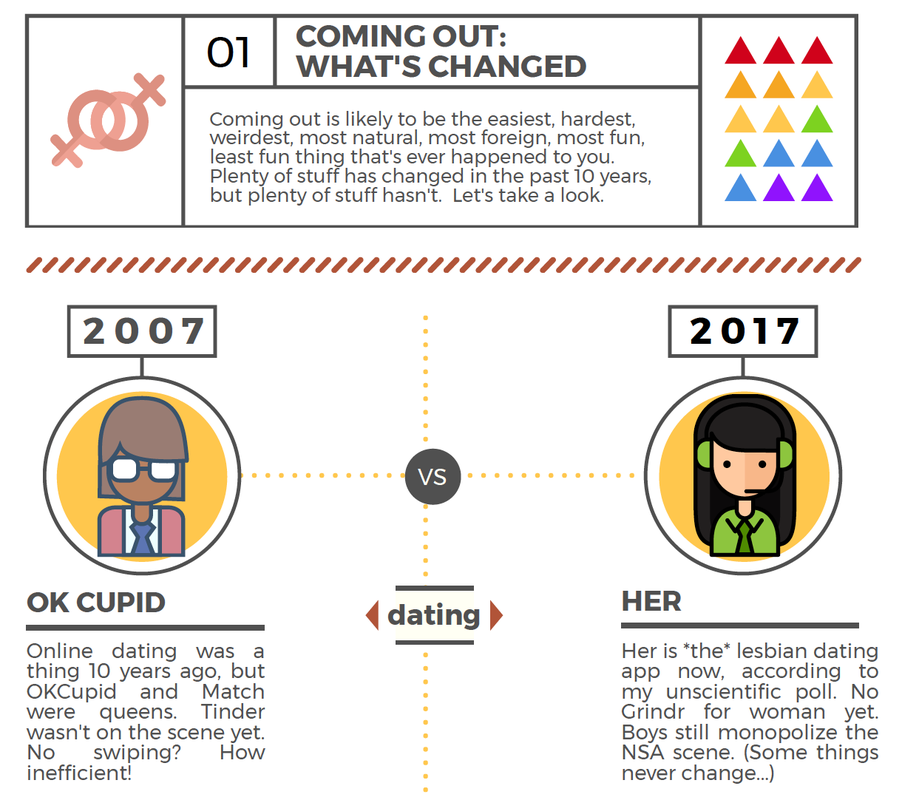
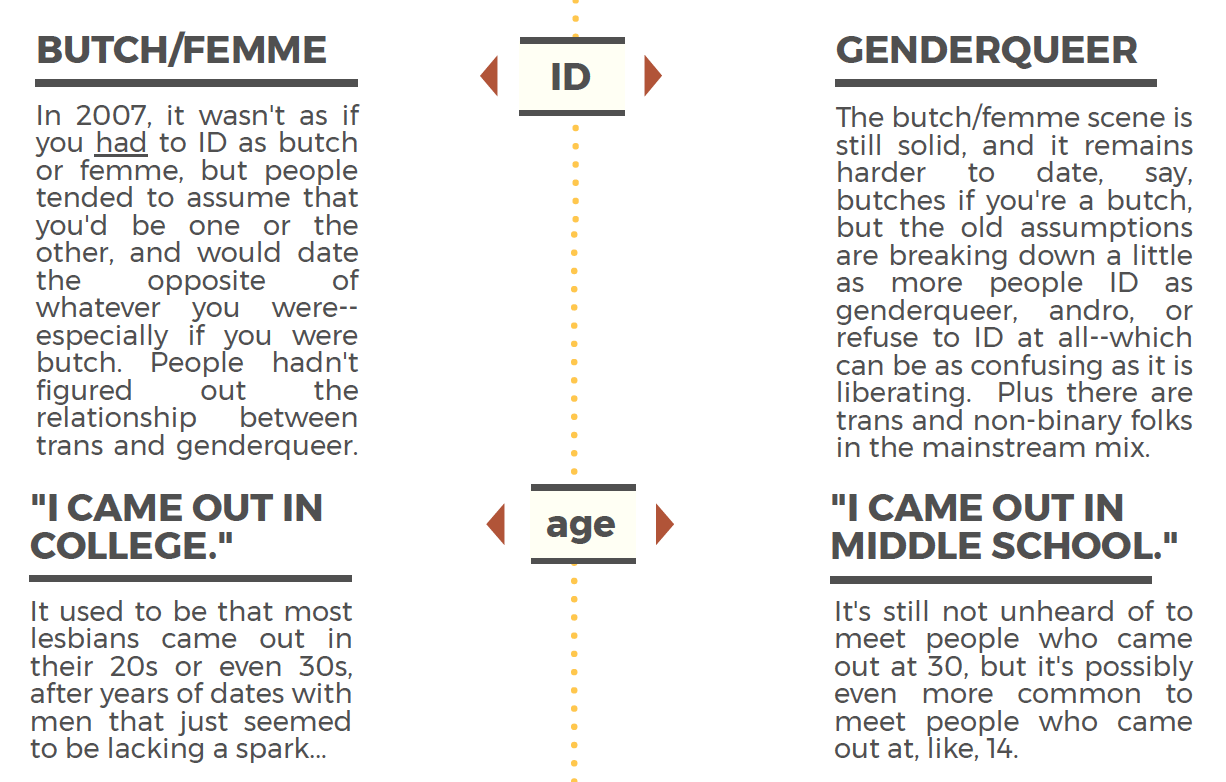
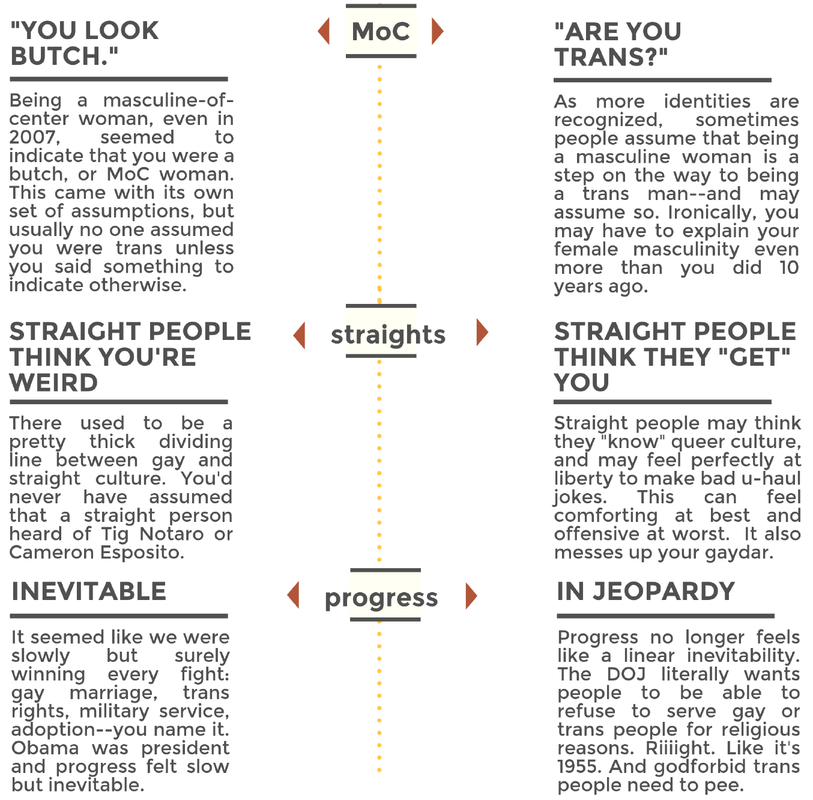
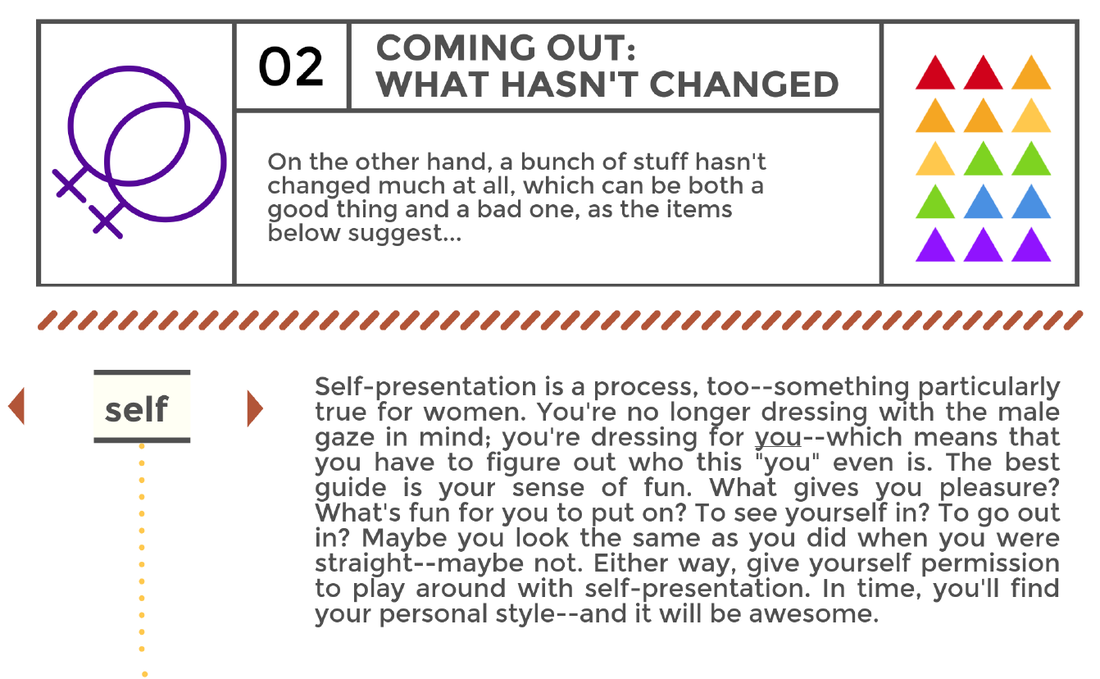


 RSS Feed
RSS Feed